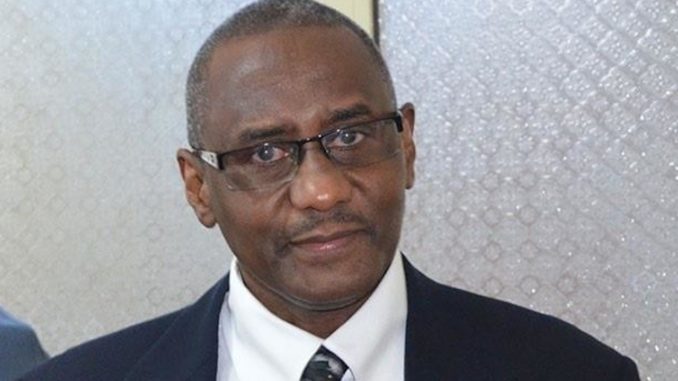
THE unfolding drama at the National Health Insurance Scheme exposes anew the latest rancid, abjectly weak and dubious approach to the anti-graft war under President Muhammadu Buhari. There, the Executive Secretary, Usman Yusuf, inebriated by the presidential backing he received in the past when he openly defied and humiliated the Minister of Health, Isaac Adewole, is once more defying another constituted authority, refusing this time, to obey a suspension order by the NHIS governing council. This is simply not how to create the right culture and build permanent institutions against corruption.
The embattled secretary took insubordination to a new level on Monday when he stormed the NHIS headquarters with dozens of policemen and State Security Service personnel and forced his way in. He advertised not only the disorderliness of this government, but also the hollowness of its anti-corruption war.
Stacked against Yusuf in the tussle with the minister and the council are the findings arising from allegations of N919 million fraud by unions and NHIS insiders and which had been investigated by the Economic and Financial Crimes Commission, the Independent Corrupt Practices and Other Related Offences Commission and a Ministry of Health panel. Just as he had been alleged to have inflated training consultancy fees, inflated staff nominal roll from 1,360 to 2,023, costing the agency N919.64 million within three months and exceeded his spending limit, he was also accused of insubordination, abuse of office and nepotism. The Vice-President, Yemi Osinbajo, then acting as president while Buhari was in London for medical attention, had backed the minister. But Buhari, on his return, without acting on the findings of investigations into Yusuf’s dealings, directly recalled him and only informed the minister, adding that the arrogant official had been “admonished to work harmoniously with the minister.”
This time, the governing council itemised nine misdeeds, bordering on corruption, disregard for board decisions and insubordination. Among these were allegations of padding the NHIS 2018 budget by N264 million, inflation of biometric capture machines cost and attempt to invest N30 billion of NHIS funds in violation of the government’s Treasury Single Account policy.
But in furtherance of his defiance of the governing council and amid workers’ vow to prevent his resumption, Yusuf, backed by policemen and some SSS operatives, forced his way in, after the security men had tear-gassed the massed workers. Just as he had insisted when Adewole first suspended him in July 2017, Yusuf was standing his ground that only the President, who appointed him, could suspend or discipline him.
This, definitely, is another major dent in the Buhari administration’s fight against graft. Time and again, Buhari comes across as a man who, though invested with so much power and responsibility, simply refuses, or is unable to take charge. The NHIS saga is typical. When things break down in an official institution, disrupting activities and attracting odium to the country, a president must restore order in line with the law and stamp his authority positively in the public interest. The claptrap at NHIS and Yusuf’s antics have gone far enough and it is all Buhari’s fault.
In 2015, the dominant issue for many voters was corruption. Buhari promised a sea change to the drab approach under previous governments, especially the inglorious era under Goodluck Jonathan. But since then, scandals involving Buhari’s close associates have either been played down or completely swept under the carpet. For instance, he failed the credibility test by failing to act swiftly when Ayo Oke, former director-general of the National Intelligence Agency was found with $43 million; when Babachir Lawal, former Secretary to the Government of the Federation, was enmeshed in a grass cutting contract scandal, and when his Army chief, Tukur Buratai, was found with unexplained assets.
Compromise is not the only absurdity undermining the Buhari government’s anti-graft campaign. He was aloof while the SSS, under the disgraced Lawal Daura, frustrated the Senate confirmation of his nominee for chairman of the EFCC; aloof when the same Daura serially sent armed agents to disrupt EFCC arrest operations. More ruinous was how the President casually dismissed allegations of abuse of contract awards that the Minister of State for Petroleum, Ibe Kachikwu, and the board of the Nigerian National Petroleum Corporation, brought against the Maikanti Baru-led oil company.
Buhari’s faulty approach to fighting corruption explains why the anti-graft agencies have only succeeded in taking down a few egregious offenders these past years. This should change. He should act now and save whatever is left of his fading reputation for zero tolerance for corruption. He could do that by backing the NHIS council and the minister. He should order the anti-graft agencies to act immediately. While Yusuf remains innocent until proven guilty by a competent court, he should step aside until investigations are completed.
Nigeria is backward because we fail to build institutions: these are based, not only on physical structures, but also on rules, processes and respect for authority. Yusuf’s claim that only the president can discipline him is a recipe for disorder. Ministers and governing boards exercise authority on behalf of the president; a president is not expected to micro-manage the over 542 ministries, departments and agencies of the Federal Government. Buhari should put things right by not only giving full backing to the council, but should go further by acting on findings and get to the root of the allegations. Ministers and boards cannot be rendered impotent by indisciplined officers. Fighting corruption requires both a strategy and objectivity: Buhari should follow through on his vow not to spare even members of his own family who break the law.
An anti-graft war can only be won through impartial political leadership, institution-building and strict adherence to the rule of law. The faltering anti-graft war needs to be re-fired on several fronts and stamping out the nonsense at NHIS is one.
END

Be the first to comment